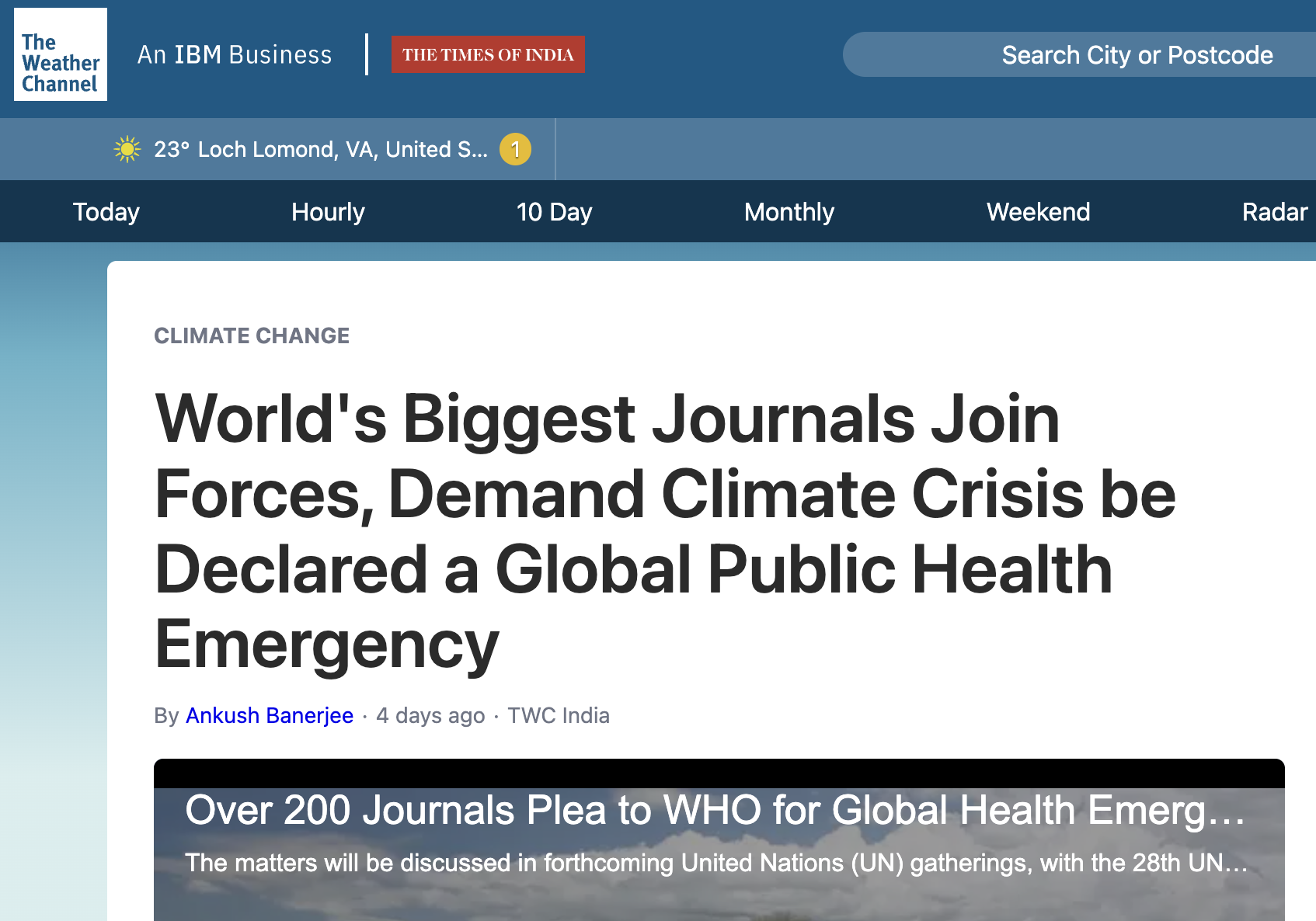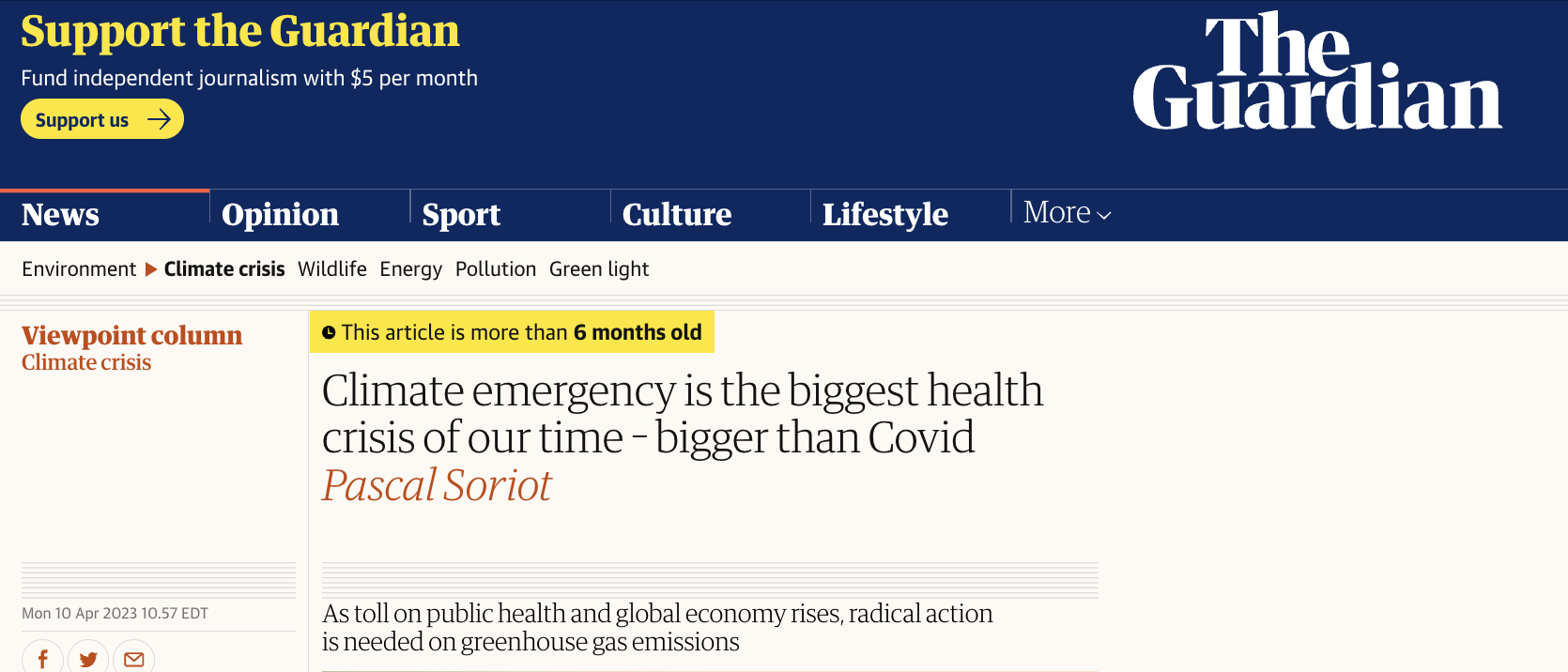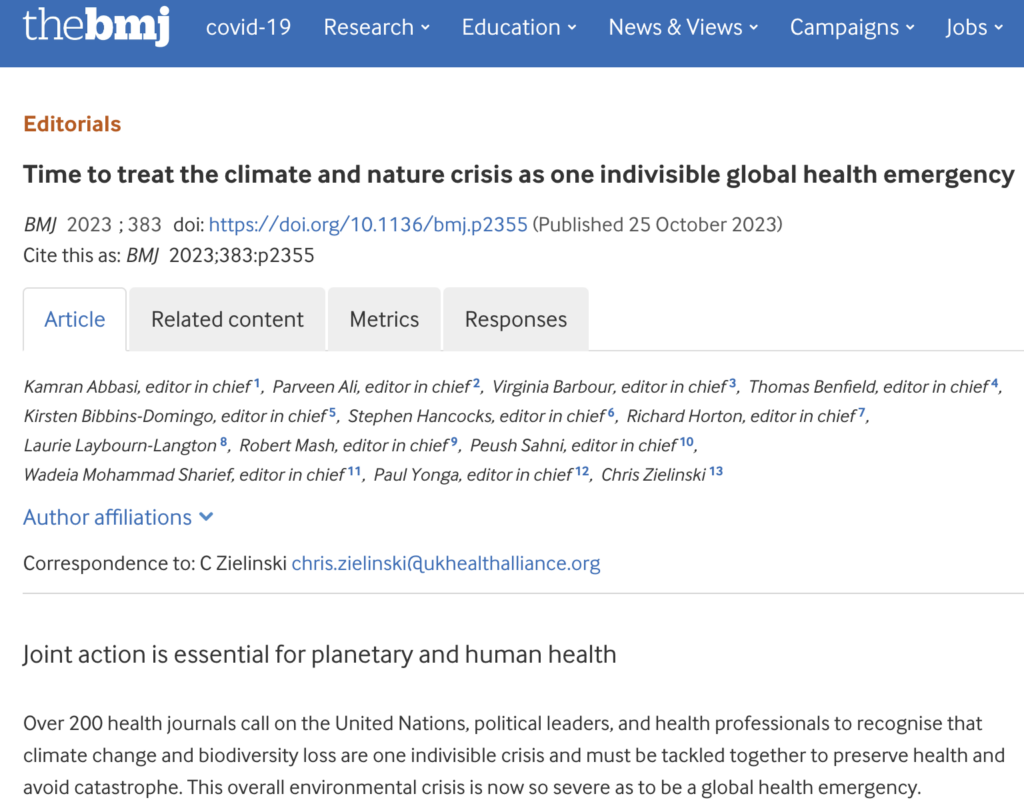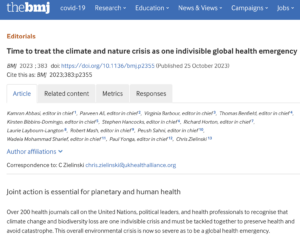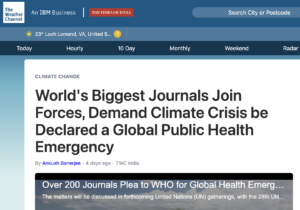https://www.bmj.com/content/383/bmj.p2355
Published 25 October 2023
BMJ 2023; 383 doi: https://doi.org/10.1136/bmj.p2355 (Published 25 October 2023)Cite this as: BMJ 2023;383:p2355
Editorials
Time to treat the climate and nature crisis as one indivisible global health emergency
BMJ 2023; 383 doi: https://doi.org/10.1136/bmj.p2355 (Published 25 October 2023)Cite this as: BMJ 2023;383:p2355
- Kamran Abbasi, editor in chief1,
- Parveen Ali, editor in chief2,
- Virginia Barbour, editor in chief3,
- Thomas Benfield, editor in chief4,
- Kirsten Bibbins-Domingo, editor in chief5,
- Stephen Hancocks, editor in chief6,
- Richard Horton, editor in chief7,
- Laurie Laybourn-Langton8,
- Robert Mash, editor in chief9,
- Peush Sahni, editor in chief10,
- Wadeia Mohammad Sharief, editor in chief11,
- Paul Yonga, editor in chief12,
- Chris Zielinski13
- Correspondence to: C Zielinski [email protected]
Over 200 health journals call on the United Nations, political leaders, and health professionals to recognise that climate change and biodiversity loss are one indivisible crisis and must be tackled together to preserve health and avoid catastrophe. This overall environmental crisis is now so severe as to be a global health emergency.
The world is currently responding to the climate crisis and the nature crisis as if they were separate challenges. This is a dangerous mistake. The 28th UN Conference of the Parties (COP) on climate change is about to be held in Dubai while the 16th COP on biodiversity is due to be held in Turkey in 2024. The research communities that provide the evidence for the two COPs are unfortunately largely separate, but they were brought together for a workshop in 2020 when they concluded: “Only by considering climate and biodiversity as parts of the same complex problem … can solutions be developed that avoid maladaptation and maximize the beneficial outcomes.”1
As the health world has recognised with the development of the concept of planetary health, the natural world is made up of one overall interdependent system. Damage to one subsystem can create feedback that damages another—for example, drought, wildfires, floods, and the other effects of rising global temperatures destroy plant life and lead to soil erosion and so inhibit carbon storage, which means more global warming.2 Climate change is set to overtake deforestation and other land use change as the primary driver of nature loss.3
Nature has a remarkable power to restore. For example, deforested land can revert to forest through natural regeneration, and marine phytoplankton, which act as natural carbon stores, turn over one billion tonnes of photosynthesising biomass every eight days.4 Indigenous peoples’ approaches to land and sea management have a particularly important role in regeneration and continuing care.5
Restoring one subsystem can help another—for example, replenishing soil could help remove greenhouse gases from the atmosphere on a vast scale.6 But actions that may benefit one subsystem can harm another—for example, planting forests with one type of tree can remove carbon dioxide from the air but can damage the biodiversity that is fundamental to healthy ecosystems.7
…
Human health is damaged directly by both the climate crisis, as the journals have described in previous editorials,89 and the nature crisis. …
Global health emergency
In December 2022 the biodiversity COP agreed on the effective conservation and management of at least 30% of the world’s land, coastal areas, and oceans by 2030.23 Industrialised countries agreed to mobilise $30bn a year to support developing nations to do so.23 These agreements echo promises made at climate COPs.
Yet many commitments made at COPs have not been met. …
The World Health Organization should declare the indivisible climate and nature crisis as a global health emergency. The three preconditions for WHO to declare a situation to be a public health emergency of international concern are that it is serious, sudden, unusual, or unexpected; carries implications for public health beyond the affected state’s national border; and may require immediate international action. Climate change seems to fulfil all those conditions.25 …
Political leaders must recognise both the severe threats to health from the planetary crisis and the benefits that can flow to health from tackling the crisis.26 But, first, we must recognise this crisis for what it is: a global health emergency.
#
World’s Biggest Journals Join Forces, Demand Climate Crisis be Declared a Global Public Health Emergency
These health journals are urging world leaders and health professionals to recognise that the climate crisis and biodiversity loss are interconnected crises, both of which pose a severe threat to human health, even insisting that the World Health Organisation (WHO) officially declare a global health emergency.
As climate change exacerbates extreme weather, pollution and disease, humans — particularly those from marginalised communities — continue to face its weighty interlinked consequences. In addition to harming ocean life, deteriorating water quality continues to worsen water-borne disease spread and the seafood crisis. Further, rapid changes in land use and climbing temperatures are breeding the perfect conditions for more pathogens to make the deadly jump to humans, leading to worrisome new diseases and pandemics.
Many studies have shown that access to green spaces is crucial for healthier communities as they help filter air pollution, reduce temperatures, and provide opportunities for physical activity. Nature has a positive impact on mental health, while also reducing stress, loneliness and depression, but these benefits are under threat due to increasing urbanisation.
Despite official goals to conserve 30% of the world’s land, coastal areas and oceans by 2030, many ecosystems are at the brink of their breaking points. Tipping over could lead to catastrophic harm to health, even if global warming is kept below a 1.5°C increase over pre-industrial levels.
Therefore, it is imperative that national climate plans be integrated with biodiversity goals. Health professionals, who command a ton of influence and trust in the public domain, have been urged to advocate for both restoring biodiversity and addressing climate change. Political leaders have also been called upon to recognisze the severe threats to health from this planetary crisis and the health benefits that can arise from taking action.
The editors of these prestigious journals have also backed a petition calling for WHO to declare a global public health emergency in May 2024. This united effort underscores the urgency of recognising and addressing the intertwined climate and nature crisis as a global health emergency.
The editorial can be accessed here.
#
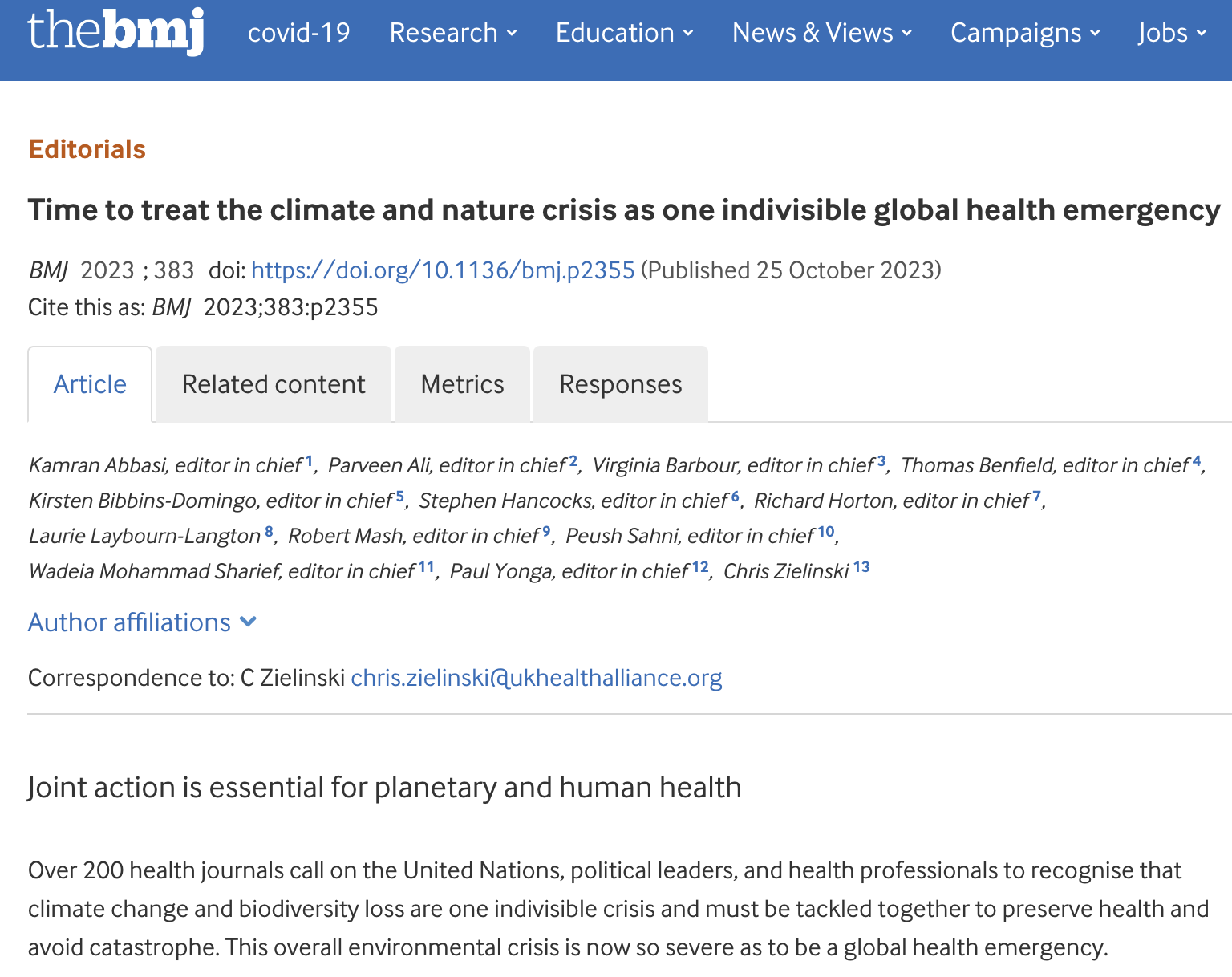
British Medical Journal: Published 25 October 2023: Over 200 health journals call on the United Nations, political leaders, and health professionals to recognize that climate change and biodiversity loss are one indivisible crisis and must be tackled together to preserve health and avoid catastrophe. This overall environmental crisis is now so severe as to be a global health emergency…
Human health is damaged directly by both the climate crisis, as the journals have described in previous editorials, and the nature crisis. …
The World Health Organization should declare the indivisible climate and nature crisis as a global health emergency. The three preconditions for WHO to declare a situation to be a public health emergency of international concern are that it is serious, sudden, unusual, or unexpected; carries implications for public health beyond the affected state’s national border; and may require immediate international action. Climate change seems to fulfil all those conditions. …
We must recognise this crisis for what it is: a global health emergency.”
#
